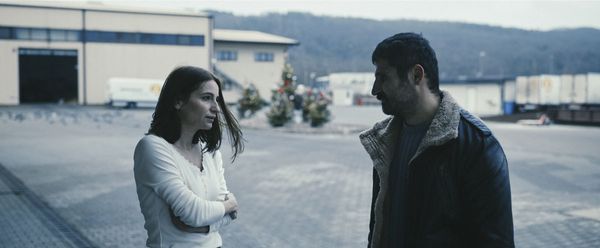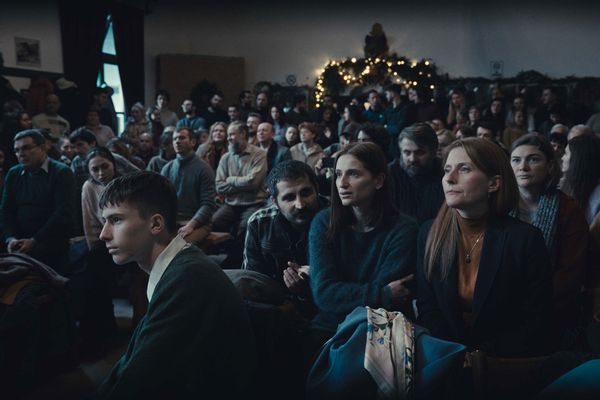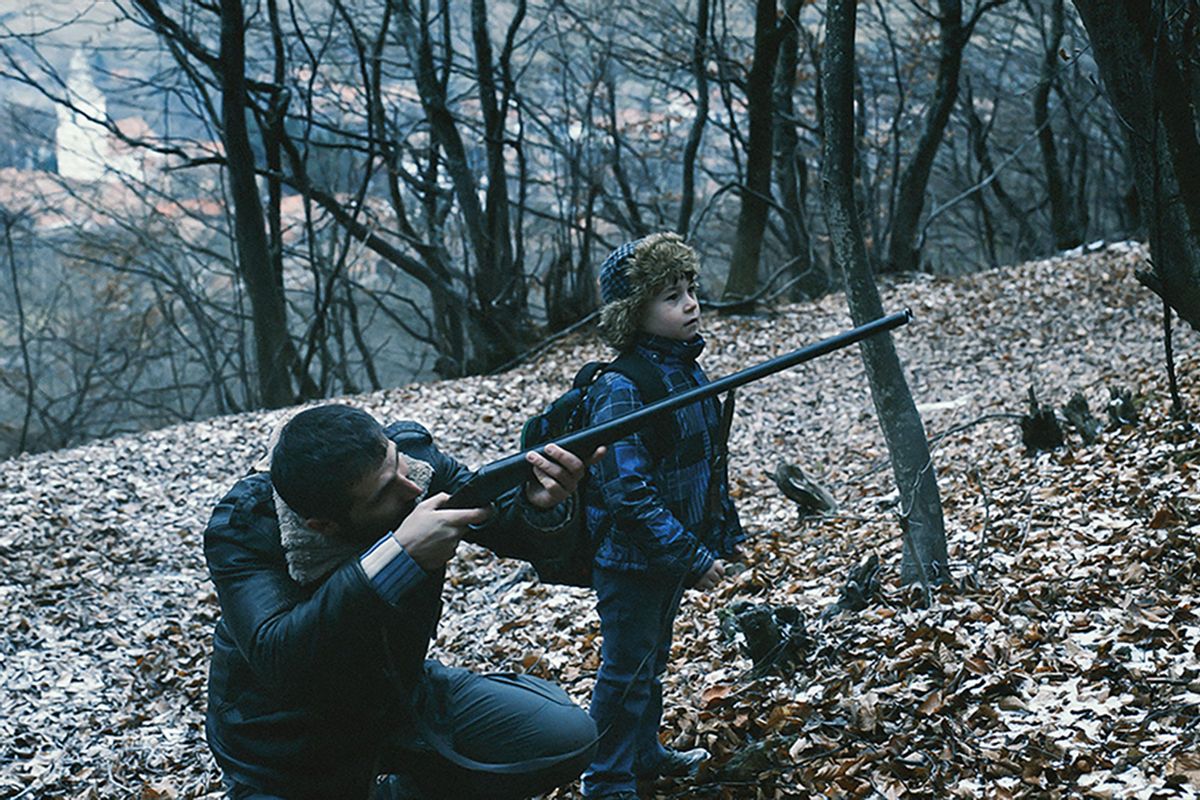"R.M.N." is Romanian writer/director Cristian Mungiu's ("Graduation") scathing indictment of xenophobia, whiteness and the socioeconomic forces that prompt individuals to leave home — or move —for jobs. The drama unfolds slowly before it fully takes shape, but it is never less than transfixing.
Matthias (Marin Grigore), who works in Germany, quits his job and returns home to Transylvania because of a family emergency. He reconnects with Csilla (Judith State), his former lover, who works in the local bakery. Csilla is looking for workers during the holiday season, and while minimum wage is not enough for Matthias, she does hire two Sri Lankans, Alick (Gihan Edirisinghe) and Mahinda (Amitha Jayasinghe). The arrival of these foreigners angers the villagers, who terrorize them and want them gone.
Mungiu creates a tense atmosphere as characters boldly express their xenophobia at church or in public. One spectacular scene depicts a heated town meeting in a nearly 20-minute-long unbroken take. But there are also scenes of characters wearing hoods and throwing firebombs at Csilla because she is housing the legal foreign workers. How fears play out in the film is what makes "R.M.N." so absorbing, and the film's strange ending packs a wallop.
Mungiu spoke with Salon about his new film and the issues of racism in Romania.
"R.M.N." is about fear. The pre-credit sequence has Matthias' son, Rudi (Mark Edward Blenyesi), seeing something in the forest on his way to school that scares him. Matthias later teaches him survival skills, telling him to fight and never feel pity. This storyline speaks volumes about the larger issues of xenophobia. Can you talk about depicting these topical themes of fear, pity and xenophobia?
"When a critical moment comes it is the animalistic side that will pop out first. "
It's more about anxiety than fear, even if they are related, in the sense that we all feel this anxiety given the catastrophic future we are facing seems that it might be coming quite soon. This anxiety is floating in the air, and Matthias feels it quite a lot and projects it on this child when he tries to help him out. There is also an association with the change brought by globalization. We have never considered the side effects, and for people, especially those who are living in more traditional, smaller communities, things are changing rapidly, and they are suddenly being told that the way they used to live is no longer valid and they need to replace it with something, and they have anxiety about having to change their lifestyle.
I hope that even if the story is set in a small village in Transylvania, that it speaks about what happens in the world today and this happens in quite a lot of places. The film is a snapshot of society and an investigation of who we are as people. We always associate with the other. Whenever something goes wrong, it is always the other who is guilty, never us. Someone who doesn't look like us. The more they look different the more we have a tribal need to belong to our group and see everyone else as potential enemies.
You wonder why, and as a filmmaker, you wonder how can you speak about such abstract issues like fear of the other. I decided to make the film about human nature and this internal conflict that I feel exists in every one of us. There is an empathic tolerant side of us and our instinctual side. This is present in each of us in different degrees. One side prevails. By the end, the main character is not a Hollywood character who knows more at the end than at the beginning, but at least he has more doubts. One side has this dark forest which has all the anxieties, and the other side is this world of warmth, and color, and music and affection and he needs to make a choice. More importantly, we need to make a choice. I'm talking about the audience as well — to ponder about these things, and be prepared, because when a critical moment comes it is the animalistic side that will pop out first.
 R.M.N. (Courtesy of Mobra Films/IFC Films)Your film is certainly critical of white supremacy groups that are on the rise in Eastern Europe and there is a growing movement for right-wing politics in Poland, but also Italy and France. What observations do you have about this frightening trend?
R.M.N. (Courtesy of Mobra Films/IFC Films)Your film is certainly critical of white supremacy groups that are on the rise in Eastern Europe and there is a growing movement for right-wing politics in Poland, but also Italy and France. What observations do you have about this frightening trend?
The film was an attempt to see what are the limits of our freedom in cinema today? Because these things have become kind of a taboo lately, and I am quoting a lot of politically incorrect opinions in the film. I was wondering if you can you still do this? In Cannes, after the screening, the journalists had great difficulties addressing questions. They didn't know how to express what they wanted to ask because they were very [wary] of this political correctness that prevented them from asking. But it is precisely this what cinema should talk about. It should bring forward things that society tends to repress especially because they are incorrect.
But presenting people from expressing what they feel won't change what they feel. They just learn that it's not OK to express this. So, we need to encourage a dialogue where we let them speak out, listen to their opinions, and then maybe find the right argument and try to change something profoundly. Political correctness has not changed anyone's opinions. This is why we keep on having surprises in elections when they vote because we have not taken the time to listen to these people. Even if we think things are clear in every situation, it's useful to listen to them. This is what I am trying to do with the film. Give these groups an opportunity to deliver what they feel and not be judgmental and not bring my point of view as a citizen. What matters, since I am just a filmmaker, is to present the complex context these people make these choice and let the audience judge for themselves. Viewers can recognize themselves in the film or recognizing someone they know, but they are covered in the dark. When they get home, they can decide how they think about these people.
I screened in a village in Romanian where this happened; it is based on a real incident. Screening in this town hall, where these people who were originally in the situation, I had two debates. The official one in the theater, but as soon as I got out, there was another one, where they were more honest. People said, this is how we think. Theoretically, we all agree it is not good to be xenophobic and intolerant, but on the ground, the situation is always more complicated.
What about this idea, expressed in the film, that "The West is watching," and, by extension, that the EU also has some investment in monitoring how countries "behave"?
This starts from this idea that sometimes people feel there is too much distance between the ideals that we have in the world and that we have as Europeans, and the present situation in some parts of Europe. People were so seduced by this idea that Europe is a monolithic place with common values and that we all have the same values and advance in same direction at the same rate.
But there are a lot of differences. Europe is not just one country and inside this continent with common values, there are a still a lot of differences of wealth and culture, and education, and habits, not to mention languages. Whenever you have such a big difference in the level of wealth, the priorities of people cannot be the same. The principles of tolerance come from societies that have reached a level of wealth that allows them to be generous and think about others. But still in some parts of Europe, there is a lot of poverty, so people have other priorities, living day to day, so these ideas are inappropriate. The EU encourages specific cooperation between countries, and it finances things that it considers to be important, while other things are to be financed by countries themselves. But 40% of Romanians living in the countryside do not have a toilet and running water in the house, and the EU is financing touristic centers in these areas. This looks like a list of priorities that do not correspond to them.
It is shocking when the churchgoers spout some hateful thing when the foreigners — who are Christian, not Muslim — want to attend a service. And the priest's behavior is questionable when he is faced with a moral issue. How much influence does the church have in villages like the one in "R.M.N."? And what observations do you have on this "groupthink" mentality?
"We are not born generous. We are instinctually in survival mode."
For me the film speaks about the clash between the individual and the group and this process in which somebody turns from being an individual with his own opinion to someone becoming a sheep in a herd and losing his personal opinion and conforming to what's safer and not have the responsibility of his own opinion. The film speaks about this need to defend one's own point of view against others because you might be right. This is about the limits of democracy today and unless you invest enough in education and given people the right info and access to truth, it might give the wrong results. You see this today in the rise of right-wing parties. It is easy to manipulate people and this discourse that they deliver that is normal and common sense. Critical thinking is not at the level it should be. The internet brings too much information. It is difficult to make your own choice. The film speaks about this effect of globalization.
The church has an involvement and responsibility of social institutions in situations like this. The responsibility is always individual. You cannot be judged for belonging to a group. It's not your responsibility what the group decides. Csilla is one of the most rational characters. She is not religious, but closer to the humanistic values religion should try to defend. Are you really trying to help people out and understand the basic values of religion or not? From this perspective, unfortunately, religion is not in best state, and it focuses more on surface things than profound values.
You feature a masterful town meeting sequence that showing how people behave when they express their opinions publicly and show their real feelings. How did you envision this sequence which you film it as a single shot?
It's a decision which is coherent with the style of the film and the style of my cinema. I make realistic films and start from what is reality, which is this continuation of the moment without the interruption of editing. This is why I shoot one shot per scene. I kept this idea for the town hall, which is a complicated scene, because I want to have the point of view of the main characters. I hope what you feel is delivered through their own point of view and different opinions. Csilla is trying to be reactive, responsive, and emotionally engaged, but Matthias thinks if he doesn't' get involved, he can't be guilty — but that's not true.
 R.M.N. (Courtesy of Mobra Films/IFC Films)
R.M.N. (Courtesy of Mobra Films/IFC Films)
It was important for me to make this scene that looks like the Tower of Babel in which people talk a lot, but don't communicate. Instead of engaging in a conversation where we listen to the other, we get in and out with our own conclusion without communicating. It was interesting to show the dynamic between individual and group. I can portray the collective character.
I did this in a practical way. It was difficult to stage such a scene. I told the actors this is the most difficult scene I have ever shot and that the actors will ever shoot. I made two choices you normally don't do as a director. I will teach actors how to speak at the same time and not one after the other. We had 26 pages, and the scene is 17 minutes. If you listen to the scene in its original language, it's a polyphonic effect. Beside the main dialogue, you can pick up and chose what you want to hear. I also told the extras, "You are actors. Just express yourselves at the level you wish." They have to fight to deliver their lines at the right moment, and this imprecision and ambiguity brought the right energy to the scene.
Want a daily wrap-up of all the news and commentary Salon has to offer? Subscribe to our morning newsletter, Crash Course.
The film also addresses the socioeconomic forces that drive folks to leave home for work as Matthias does, but also the Sri Lankans. The issue of legal migrant workers seems to be fine for the characters whose family members need to look to other countries for jobs, but not OK when foreigners are employed in their community. There is also an interesting character, Ben (Victor Benderra), who is French and working in the village counting bears for an NGO. Can you talk about why this is and this double standard?
It's the way because people are not reasonable. Even if we like imagining we are wonderful, superior, rational and empathetic beings, we are not. We are very violent, irrational creatures at times. This was the starting point of the film: Why are these people believing this? When we go to the West to work there, we hate when we are badly treated. But we employ a different judgment whenever people poorer than us come to our village. We don't see anything wrong with this. That is not reasonable. People do not apply same judgment to similar situations. They want the best of everything, which is very selfish. This is a portrait of how we are today. To be generous requires an effort. These things require education. We are not born generous. We are instinctually in survival mode. Empathy and generosity came with religion, education and culture.
At a crucial moment, a dark side of us will pop up. We see this in Ukrainian war — people will kill, torture and rape someone who yesterday was their neighbor. Some propaganda and a few arguments, and all of a sudden, they see the other as an enemy. These are people with pretty much the same language and history. This doesn't say something nice about us as a race or about human nature. Also, what was relevant for me, is that a region inhabited by a minority you would expect them to have empathy for another minority, but on the contrary; their feeling as a minority made them want to defend and protect their region and communities and not allow anyone else to get inside. They weren't precisely against foreigners — they are against anybody getting into their region to preserve it as it is. I was looking to show how this is happening and why that is for a lot of historical reasons. I hope that Transylvania stands for Europe and the world, a mix of religions and languages, and this need for people to learn how to coexist with others. The world is not going back with fewer nations and white people living in certain borders. But for people in smaller more traditional communities, it will take a while for them to realize this is happening. Hungary was pleased that someone was making film about the effects of official politics, and they were happy they saw the film as a criticism of what [Viktor] Orbán was doing.
"R.M.N." opens in theatres is available on VOD April 28.

Shares